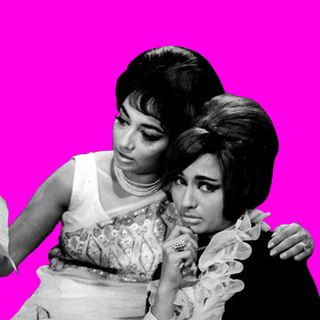
In Defense of Quiet Passion
The expectation that passion should be loud and visible distances us from the joy of self-discovery.

“I suffer from a lot of doubt about broadcasting my passions on social media,” says Ruchi Singh Vasudev, a writer based in Assam. “Be it something that might seem innocuous as a favourite movie or a song to publishing my writing in a blog. The problem with growing up with the internet is that now it’s a knee-jerk reaction for me to want to post something that I feel passionately about.”
With today’s digital spaces blurring the boundaries between the public and private, Vasudev’s experience speaks to how there is an immense expectation to curate not only our professional achievements but also our personal passions for public consumption.
However, when passion becomes entangled with the idea of success – one that hinges on visibility and acquiring recognition, especially in a social-media dominated world – it may cease to be a source of personal joy, instead transforming into a source of pressure. Although society tells us that passion must be loud and visible, our passions are often deeply personal and unique in their expression.
As the optics of passion assume greater importance and our expression of it risks becoming performative, what do we stand to lose?
According to Vasudev, the more visible a passion is, the more it panders to public perception. Sree, a Kerala-based artist, agrees, going so far as to say that passion existing in the public domain can be destructive. Artists, for instance, may feel discouraged to pursue their own specific interests, instead adapting it to what the audience seems to want.
“[Y]ou end up diluting your art so that you can consistently keep producing it… [This] defeats the entire purpose of passion. Passion is something you do for yourself… The public display of passion, I think, also deters a lot of people from throwing themselves into what they are passionate about, because that publicization invariably leads to comparison,” Sree explains.
Under a capitalist system, the pursuit of profit is increasingly shaping our relationship with passion as well. Passion advocacy that emphasizes the employment of passion in a productive manner is extremely common on the internet. Most of these posts seem to be underlining a central theme: passion is the key to success. In 2020, one such tweet caught Banda Mann’s eye: “If you haven’t found a way to monetize your passion, then have you really maximized your potential?”
“That got me thinking deeply,” Mann, 27, says.
“I was completely stumped because I thought passion was something that maybe you just enjoyed doing, and that you gained from it on a personal level rather than a monetary one.”
Related on The Swaddle:
Why the Cult of ‘Doing What You Love’ Is Losing Steam
It is not just passion’s ties with productivity that distance it from the self. Over time, a cultural discourse that tends to romanticize passion has framed it as something that is discovered out in the world, rather than within us. The common adage of “find your passion” – which we’ve all heard variations of in the context of our careers and personal lives – offers a clue to this externalization of passion. While this notion has gained popularity, researchers at Stanford have rejected it, arguing that passions aren’t found but developed.
Solitude may thus allow us to drown out the noise and understand what we derive from our passions, as opposed to our innate passions becoming captive to societal expectations. It can foster a non-judgmental space for one to explore their interests without the fear of failure looming over them. As Vasudev says, “Passions and interests are cultivated in solitude, even if it might be something as collaborative as a team sport. The self-education in the topic of interest requires a kind of discipline that can’t be taught. It’s only fuelled by passion.”
However, moments of solitude are harder to find today and need to be consciously carved out in daily schedules. “Earlier, you had to make an effort to put things out. Now you have to make an effort to keep things private,” Sree says, while clarifying that there is no harm in choosing to make one’s passions public or pursuing it as a career, as long as one does so on their own terms.
The idea that career decisions should be based on notions of identity, fulfillment, and finding meaning in one’s work has also become immensely popular. Erin Cech, a sociologist, called this the “passion principle” in her book The Trouble With Passion. When passion and career become intermeshed, however, it gives rise to the burden of having to be consistent in the performance of one’s passion which could quickly lead to a kind of passion fatigue. Failing to do so may result in the loss of clients, networking opportunities, and even one’s self-esteem.
Ayushi Chaurasia, an archivist, is creating a balance for herself in this regard. She has attempted to separate art – her passion – from her profession. She believes that the pressure to constantly create, not for yourself, but for an online audience, could lead to losing that passionate spark that energizes individuals in the first place.
“If you are putting your ideas and pieces of your soul out, it just burns you out. It [art] is something I do on my own, and of course it involves putting it out and curating my personality around that… The performative aspect will remain, but at the same time I would not like to do it full time.”
An argument for a more public expression of one’s passions could be the factor of accountability. For some, keeping the larger audience in mind may help overcome spells of demotivation and foster a regular practice of the activity they feel passionately about. However, Sree disagrees. “When your passion is something you need to be accountable for, I think that’s when it starts deteriorating in intensity. It’s free exploration and experience right? The idea of passion is to indulge yourself, but the second you factor in accountability, it becomes a job.”
The default understanding is that passion must be “all consuming.” To counter this, a paper in the Journal of Personality and Social Psychology proposed a dualistic approach to passion, where the two are distinguishable based on how closely one’s passion is linked to their identity. Harmonious passion is when one chooses to engage in an activity without feeling compelled to, since “the activity occupies a significant but not overpowering space in the person’s identity,” and remains in harmony with other aspects of the individual’s life. On the other hand, obsessive passion is when the activity becomes closely tied to one’s self-esteem, which can quickly become detrimental. An article in The Atlantic noted, “Just thinking about success and failure affects the performance of the obsessively passionate…”
Related on The Swaddle:
A Psychologist’s Guide to Reducing the Impact of Social Media
In contrast, Arun Kumar Ravichandran’s perception of passion centers personal growth. He began participating in triathlons solely for “the sake of exploration.” Initially, he would document his runs on social media, but has stopped doing that now. “In reality, I [run] more than what I used to, but I don’t post it.”
The rewards and recognition that may come with pursuing one’s passions are secondary for Ravichandran, who works at a logistics startup in Chennai. “If it happens, well and good. If it doesn’t happen, I don’t mind either. Because I’m already getting my reward. I am already getting to learn about myself and that is the biggest reward anyone can offer you.”
Therefore, how we define passion and success determines our relationship with both. For Muskan Nagpal, a journalism student, the notion that passion is singular, and must last forever, has birthed skepticism. “Passion sounds like a concept that has to be fixed for the rest of your life. And that’s where I have a problem with this passion culture,” she says. Ravichandran agrees, saying our passions are “constantly changing,” offering new opportunities for self discovery. Growing alongside our passions would mean creating the time and space to develop them.
How do we, then, find our way back to a more quiet exploration of passion? Akash Saxena, co-founder of a mental health organization says it depends on how we navigate our relationship with our passions. “I think if a person has a secure private relationship with their passion, the world out there can do little to disturb that. At least if the person moves with the awareness that their relationship with their passion is personal.”
Ananya Singh is a Senior Staff Writer at TheSwaddle. She has previously worked as a journalist, researcher and copy editor. Her work explores the intersection of environment, gender and health, with a focus on social and climate justice.
Related


Woe Is Me! “I Cannot Afford a Holiday Trip With my Friends. How Do I Tell Them?”
